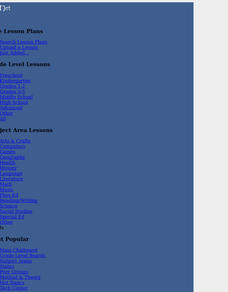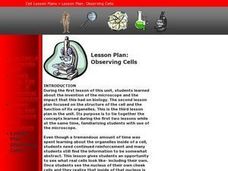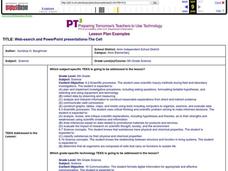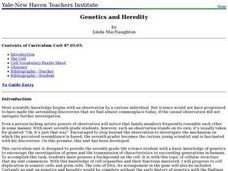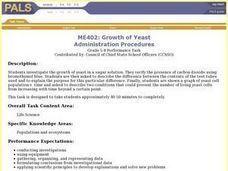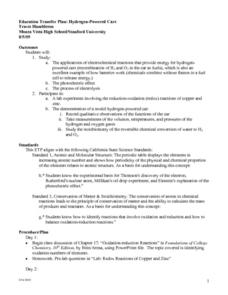National Center for Case Study Teaching in Science
Bad Fish, Bad Bird
In an advanced biology lesson, learners see a PowerPoint about biologist Dr. Westwood, a two-time victim of poisoning. Designed to be used with clickers in the classroom, you could modify the lesson by creating a worksheet from the...
Curated OER
Small Pox Scare Wks 1-2
Students identify basic similarities and differences between B- and T-lymphocytes, stressing function, location, and role. They complete a worksheet that requires them to apply knowledge about ELISA and antibodies.
Curated OER
Making Blood!
students research blood's components, and use their math skills to recreate a model of whole blood using commonly found food items.
Curated OER
Surface to Volume Ratios
Students measure the rate of diffusion and to calculate the surface area to volume ratios of varying cell sizes. The lesson is very clearly organized with a useful student worksheet provided. They perform a lab experiment which is...
Curated OER
DNA Extraction
Students extract and observe a visible amount of DNA from Escherichia. coli cells. They discuss the properties of DNA. Confirmation of the presence of DNA by a reaction with an indicator is confirmed within this lesson. Many hands-on...
Curated OER
Lesson on Proteins
Students examine the importance of proteins including their function and structure. In this protein lesson students play a game to help them better understand proteins.
Curated OER
Cell physiology and chemistry
Students design an experiment to discriminate between chemical diffusion, osmosis, facilitated diffusion and active transport through a membrane. Be specific about predictions and interpretations!
Curated OER
Web-search And PowerPoint Presentations-The Cell
Sixth graders create a PowerPoint presentation using information that they have compiled from their web search and rubric web sites, text and other applicable references. They work in pairs to complete these searches and projects.
Curated OER
The Meaning of Genetic Variation
Students investigate variation in the beta globin gene by identifying base changes that do and do not alter function, and by using several Internet-based resources to consider the significance in different environments of the base...
Curated OER
Using the Microscope
Students demonstrate their ability to properly make observations using a compound microscope. They prepare an onion skin slide and focus on it in both low and high power. Then they measure the diameter of one of the cells.
Curated OER
Biology: Understanding Cellular Organelles
Students distinguish the differences between Prokaryotic and Eukaryotic cells. Using microscopes, they examine a variety of plant and animal cells. Working in groups, they draw and label plant and animal cells and show the mathematical...
Curated OER
How To Make an Artificial Organ
Students examine the advances made in technology with regard to prosthetics and replacement organs and limbs. They describe the anatomy and functions of different organs and create their own artificial organ. They defend and present...
Curated OER
Biology: Genetics and Heredity
Seventh graders explore the connection between genetics and heredity by examining the cellular structure. Among the numerous activities to engage students are drawing DNA molecules, vocabulary puzzle sheets, and predicting possible...
Curated OER
What Makes Bones Strong?
Students explore the function of bone, muscle, and skin. Pasta and rubber bands are used to model how minerals and collagen contribute to bone strength. The effects of the reduction of these substances are explored in chicken bones.
Curated OER
Biomechanics of Sports
Students examine the body's major organ systems and how they function and influence each other. They examine how the human body moves when involved in sports.
Curated OER
Feed Me, Seymour
Students work in small groups to create posters illustrating the major facts and functions of plant organs. Within their groups, they assume the role of specialists creating specialized posters pertaining to the different parts of plants.
Curated OER
Hearing and Sound
High schoolers construct a model of the ear to learn the parts of the ear. In this ear lesson plan, students build a model and use a poster to determine the structures and functions of each structure in the ear.
Curated OER
ME402: Growth of Yeast
Students investigate the growth of yeast in a sugar solution. They verify the pressure of carbon dioxide using bromothymol blue. Students are asked to describe the difference between the contents of the test tubes used and to explain...
Curated OER
How Do Flowering Plants Reproduce
Students investigate how flowering plants reproduce. They identify and describe the functions of the major sexual organs of a flower and fruit by examining and dissecting flowers and fruit.
Curated OER
Hydrogen Powered Cars
Young scholars apply the principles of chemistry to investigate the concept of how a hydrogen powered car works. They study the electrochemical reactions that provide the energy source. Students also record observations in the...
Curated OER
Biology Trivia Questions
Students answer 71 questions about a variety of topics in biology. In this biology trivia lesson plan, students use the internet to find the answer to questions about the systems of the body, their structures and functions, the different...
Curated OER
Making Connections: Exploring Our Brains through the Five Senses
Students record observations and create drawings and models of anatomy using their five senses. They describe the structures of a neuron and analyze each of their functions. They compare and contrast the typical structural features of a...
National Nanotechnology Infrastructure Network
Save the Dinosaurs with Copper and Zinc!
Create a coat of armor for dinosaur volunteers. Young scientists explore the oxidation-reduction reaction facilitated by electric current. The result of the reaction is a dinosaur coated in copper and zinc, which leads to an...



